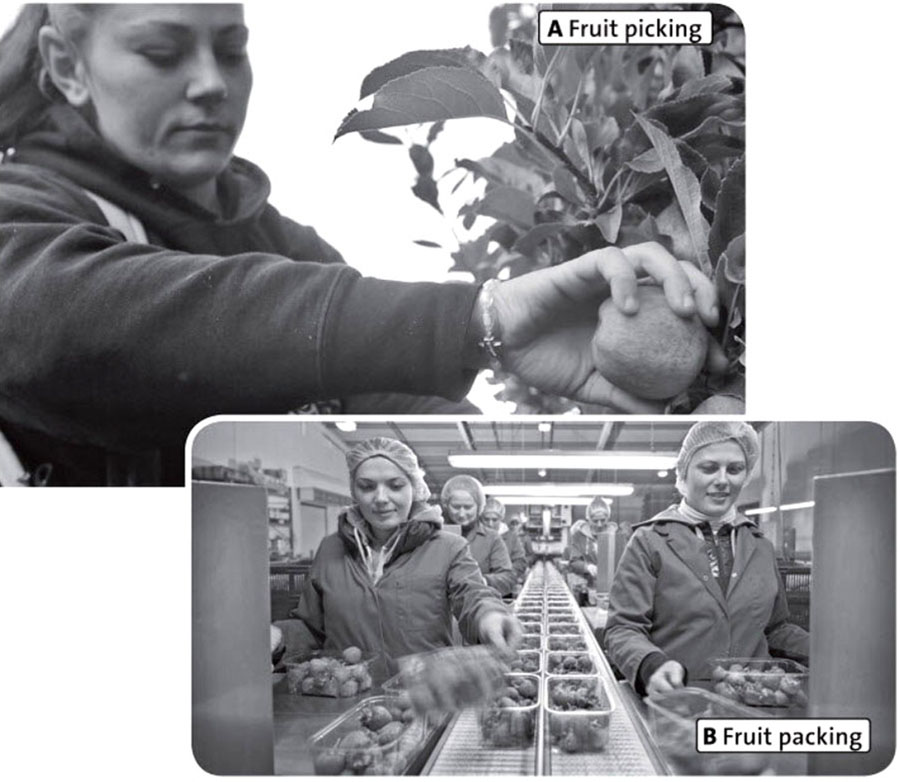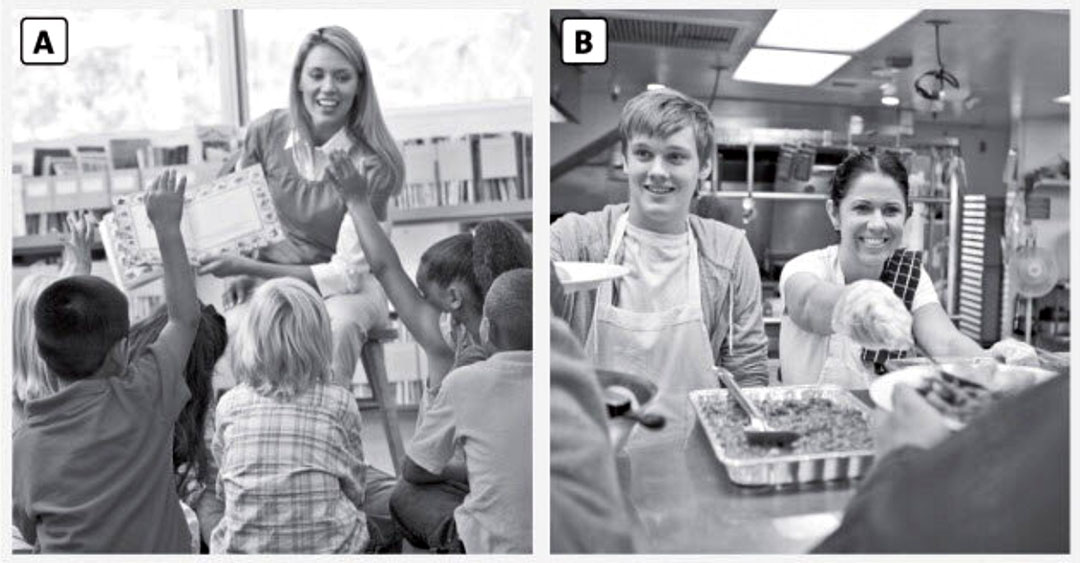1. Listen to a teenage boy enquiring about a job. Complete the information.

Job: A or B? ………………………………………………….
Responsibilities:
1……………………………………………….
2……………………………………………….
Salary: ……………………………
Hours: ……………………………
Accommodation included? ……………………………………………….
Answer
Job A (fruit picking)
1 pick apples 2
put them in boxes
Salary £8 p/h
Hours 7 a.m.–4 p.m.
Accommodation No
Transcript
See exercise 3.
2. Complete the Speaking Strategy with the words below.
ask question reminds something speaking thing
Speaking Strategy
Make sure that you refer to all four points in the task. You may need to move the conversation on in order to cover all four topics. Use phrases like:
Moving on to the 1……………………… of … ◻
Another 2……………………… I wanted to ask / know is … ◻
3……………………… else I’d like to talk about is … ◻
Could I possibly 4……………………… you about …? ◻
5……………………… of X (if X has been mentioned) ◻
That 6……………………… me, … (if there is a link with something you want to say or ask) ◻
Answer
1 question 2 thing 3 Something 4 ask
5 Speaking 6 reminds
3. Listen again. Tick the phrases in the Speaking Strategy that the interviewee uses.
Answer
Moving on to the question of …,
Another thing I wanted to ask / know is …
Could I possibly ask you about … ?,
Speaking of …
Transcript
Boy I’m ringing to enquire about the job of fruit-picker, which I saw advertised on your website. Could I possibly ask you some questions about it?
Manager Certainly. What would you like to know?
B Well, first of all, may I ask what the responsibilities are?
M That’s an easy question to answer. You have to pick apples. And then you put them into boxes.
B I see. Another thing I wanted to know is, how much do you pay?
M We pay quite well. It’s £8 an hour. Your total salary depends on how many hours you work, of course.
B Speaking of hours, what time would I start work? And what time would I finish?
M We start early, at seven in the morning and finish at four in the afternoon.
B Moving on to the question of accommodation, do you provide your workers with anywhere to stay, or do we have to find out own accommodation?
M No we don’t provide accommodation, I’m afraid, but there is a large hostel near the farm.
B OK, thanks very much for your help. I’ll have a think about it and get back to you.
M You’re welcome. Bye now.
B Goodbye.
4. Match 1-5 with a-e to make the start of indirect questions.
1 Could you
2 I’d be
3 I’d like
4 May
5 I was
a I ask …
b tell me …
c interested to know …
d wondering …
e to know …
Answer
1 b 2 c 3 e 4 a 5 d
5. Listen to a teenage girl enquiring about a job. Complete the information.
Job: 1………………………………………
Responsibilities:
2……………………………………………..
3……………………………………………..
4……………………………………………..
Salary: 5…………………………………..
Travel expenses included? 6………………………………………….
Answer
1 hotel receptionist 2 checking guests in
3 checking guests out 4 answering the phone
5 £250 for a 35-hour week 6 No
Transcript
See exercise 5.
6. Listen again. Complete the indirect questions with phrases from exercise 4.
1 …………………………………… if I could ask you some questions.
2 …………………………………… what the job involves?
3 …………………………………… what experience is required.
4 …………………………………… what the salary is.
Answer
1 I was wondering 2 May I ask
3 I’d be interested to know 4 I’d like to know
Transcript
Receptionist Hello. King Edward Hotel. Can I help you?
Girl Yes, I’m ringing about the job of hotel receptionist.
R I’ll put you through to the manager. Hold the line, please.
Manager Hello, can I help you?
G Yes, I’m calling about the post of hotel receptionist and I was wondering if I could ask you some questions.
M Sure. What would you like to know?
G Well, first of all, may I ask what the job involves?
M The main responsibilities are checking guests in, checking guests out, and answering the phone.
G OK. I’d be interested to know what experience is required.
M Yes, ideally we want someone who has experience of working in a hotel, and has dealt with guests.
G Well, I worked in a hotel in my hometown for three months last summer.
M That sounds ideal. And knowledge of French or Spanish would be an advantage.
G I speak a bit of French.
M That’s good. You also need to be polite and hard-working, and very patient when dealing with the guests.
G Yes, I’m sure I can do that. Moving on to the question of pay, I’d like to know what the salary is.
M The salary is £250 for a 35-hour week.
G And are travel expenses included?
M No, they aren’t.
G I see. Thank you.
M Well, we’re interviewing next week. If you are still interested, please fill in the application online, and we’ll contact you.
7. Read the task. Prepare questions about the information below. Think of follow-up questions to find out more details.
You have applied for a part-time holiday job as a sales assistant in a supermarket. You are going for an interview with the store manager. Prepare questions for the interview about these four points.
– responsibilities
– personal qualities and experience required
– hours of work and salary
– travel expenses.
1 Responsibilities?
…………………………………………..
…………………………………………..
2 Personal qualities?
…………………………………………..
…………………………………………..
3 Experience required?
…………………………………………..
…………………………………………..
4 Hours of work?
…………………………………………..
…………………………………………..
5 Salary?
…………………………………………..
…………………………………………..
6 Travel expenses?
…………………………………………..
…………………………………………..
Answer
your own answers
8. Now do the speaking task above. Use your notes from exercise 7
Answer
your own answers
Extra exercises
Strategy
Start by describing the photos in general. Contrast the photos by describing who the people are, what they are doing and where they are. Then describe some details in the photo. Finish with a personal comment or some speculation about the photos.
1. Read the Strategy. Put sentences A-D in the correct order (1-4).
A I think the first photo might be a farm in Argentina. It’s very beautiful. The second photo looks like France, or maybe it’s Italy.
B In this photo, the people are working with horses.
C Both photos show people working on a farm.
D In the second photo, the people are picking fruit rather than working with animals.
Answer
A 4 B 2 C 1 D 3
2. Photos (A and B) show young people doing part-time work in their holidays. Compare and contrast them. Include the following:
– typical jobs that young people do part-time.
– why young people do part-time work
– what skills people can learn by doing holiday work

3. In pairs, ask and answer the questions. If possible, use evidence from the photos in your discussion.
1 What kinds of skills and personality do people who work with young children need?
2 Which of the two part-time jobs shown in photos A and B would you rather do? Why?
Answer
your own answers
Related Posts
- English Speaking Exercises for B1 – Guided conversation
- English Speaking Exercises for B1 – Photo description
- English Speaking Exercises for B1 – Photo comparison and role-play
- English Speaking Exercises for B1 – Photo comparison
- English Speaking Exercises for B1 – Photo comparison and discussion
- English Speaking Exercises for B1 – Photo description
